Mothering on trains: cornered by immigration policies
viernes, marzo 1, 2024
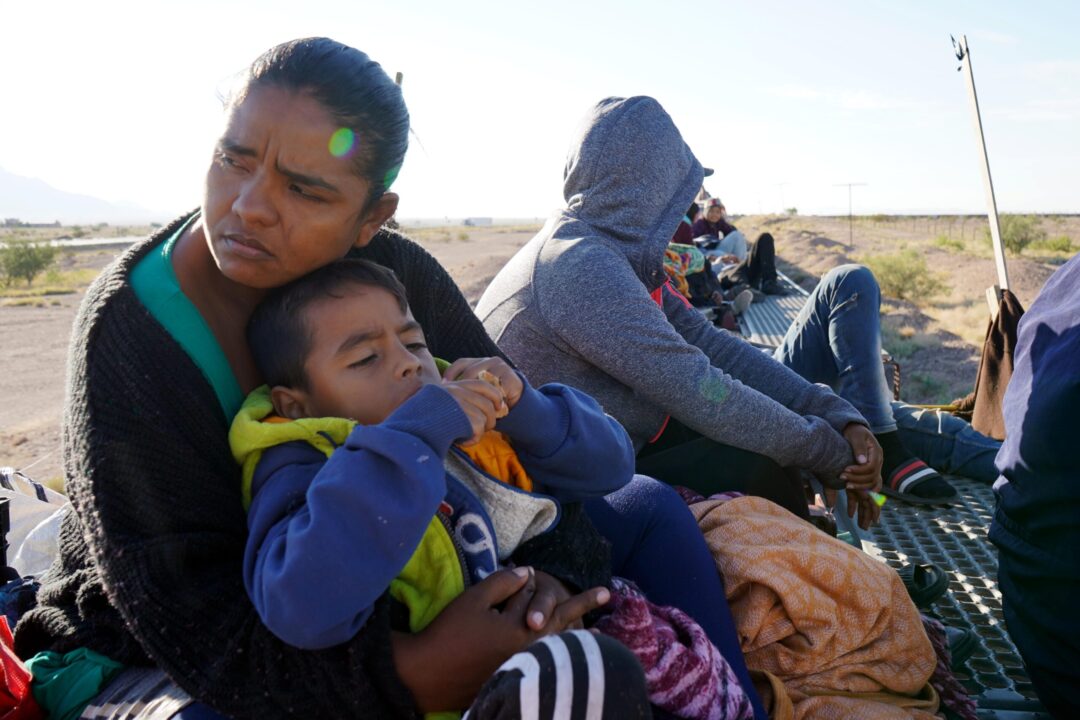
Migrant women are pushed to remain in Mexico, where they fight a battle for their human rights as policies, mass deportations, and immigration measures such as Remain in Mexico, Title 42, and CBP’s One App. work against them
By Alicia Fernández / La Verdad
Elizabeth celebrated her son Wilma Gerardo’s sixth birthday on a freight train that crossed the Chihuahuan desert, after traveling thousands of kilometers from her native Venezuela to reach the Mexican border with the United States.
She sits next to her husband while listening to the child say that he will never forget this day. As a gift for his birthday, he received a piece of candy and a plastic cart. Wilma created a story whose protagonist is “the shameless princess,” who is his new friend and train carriage companion who also travels with her family and is the same age as him.
Holding her child curled up with her arms on her chest, Elizabeth and her family spent three days on that train on the Torreón-Ciudad Juárez route a couple of other days they spent on a different train. They only have water to drink, food, and they endure the dry climate and the sun as they are exposed to the elements all day. She, her son, and her husband became ill.
“Her nose was bleeding, she had headaches and she felt like vomiting. She had a fever, a fever that felt as if it came from the Sun and the rain that we get (while traveling),” said Elizabeth while holding Wilma, whom she never imagined would raise on a cargo train.
She is three – almost four months – months pregnant, and that makes her feel even worse, says the woman who has been traveling for months, on vans, walking, and on freight trains.
One day before starting their journey through the desert in the city of Chihuahua, Chihuahua, Mexico, an operation that included the Mexican National Guard, the Chihuahua State Police, and the National Immigration Institute tried to persuade Elizabeth and her family to get off the training wagon, in which at least a thousand people were traveling towards Ciudad Juárez and seeking to cross into the U.S.
Some of the migrants got off and split up to reboard two other trains. The train where Elizabeth is traveling with her son and her husband continues its journey but moves very slowly. It stops for hours at four points along the route, and migrants are forced to spend cold nights and hot desert days on top of the train cars.
Along with Elizabeth and her family, about 400 other people migrating follow their journeys. Mostly women, fathers, mothers with children, and single and pregnant mothers. Among one of these women is Nicole, also from Venezuela, who is nine months pregnant and urgently needs to get to the border to surrender to the U.S. authorities before having to go into labor.
The roofs of the trains are covered with industrial iron and screws, and everyone is alerted to the risk of tripping and taking a fatal fall from the top of the moving car. Some women tie their sons and daughters to these irons to reduce their risk of falling off the train.
When they arrive in Ciudad Juárez, they get off the train and continue the road to the border wall on foot. Elizabeth and her family walked for a few hours towards the Mexican side of gate 36, an unofficial entry point on the iron border wall installed along the border by the U.S. government.This is where hundreds of migrants arrive when they get off the train to surrender to Customs and Border Protection (CBP) agents of the U.S.
Elizabeth says that reaching that door represents a possibility of getting medical attention for Wilma, who suffers from epileptic seizures, which could not be treated in Venezuela.
At the site, a polluted river awaits them, a double barbed wire installed by the Texas National Guard, and soldiers who seek to keep them away from U.S. territory; while on the Mexican side of the river, dozens of Mexican immigration agents and the Ciudad Juárez police seek to persuade migrants not to cross the border.
Elizabeth and dozens of foreign women who travel with their sons and daughters of different ages experience what is considered the most recent humanitarian crisis related to people who migrate because many became stranded along the way. Ferromex, a railway company of Grupo México, had suspended operations of dozens of freight trains with routes to the north of the country to prevent migrants from boarding.
Thousands of people on their migrating journeys were left stuck in different parts of the country, where they consume their limited basic food resources and do not have money to purchase more, where they have to sleep outdoors and become victims of violence, which is documented by organizations such as the Institute for Women in Migration (IMUMI). Migrants also develop diseases and have little access to health services.
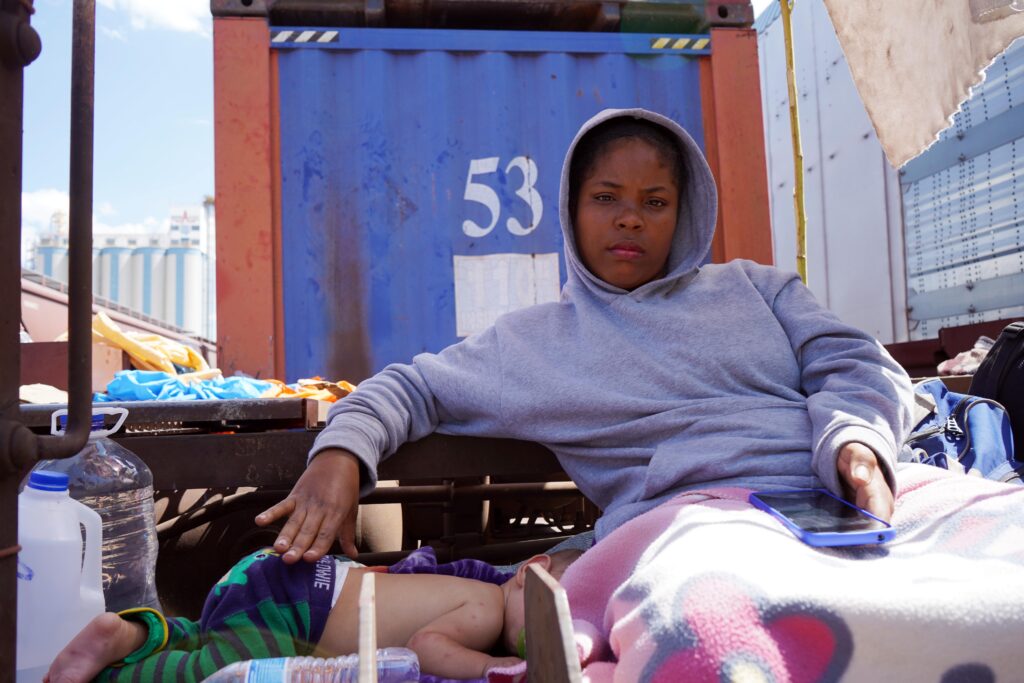
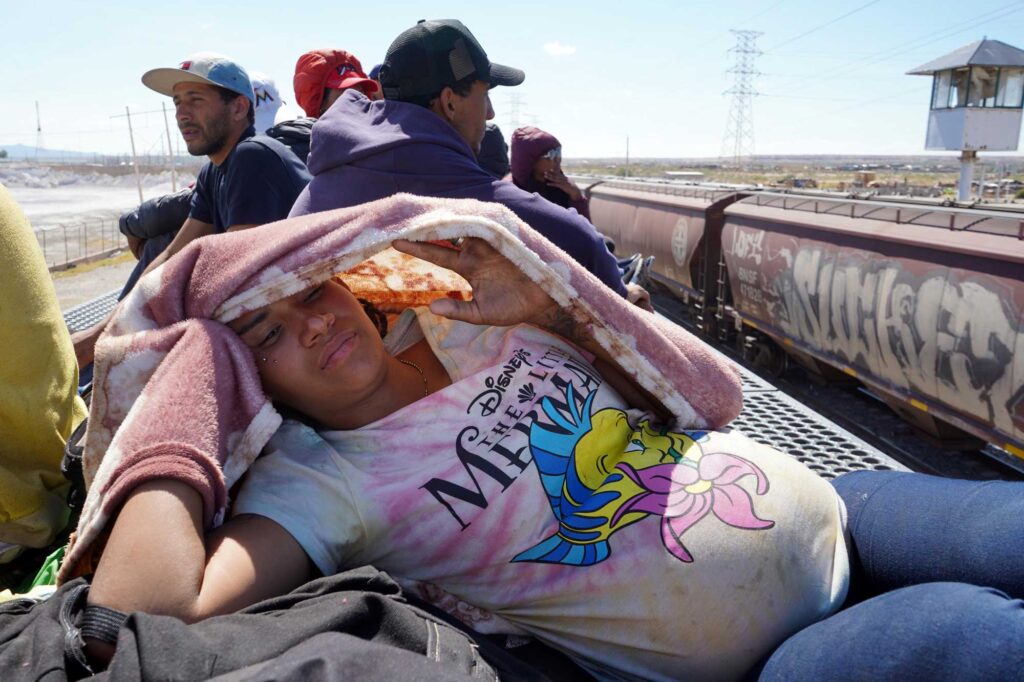
Nicole, nine months pregnant, rides the freight train to Ciudad Juárez, hoping to arrive before she goes into labor.
A 22-year-old Venezuelan woman, who asked not to be identified, poses for a photograph on the sidewalk of a gas station where she is looking for a place to sleep after she was expelled from the Ferromex yards by immigration authorities in the city of Chihuahua.
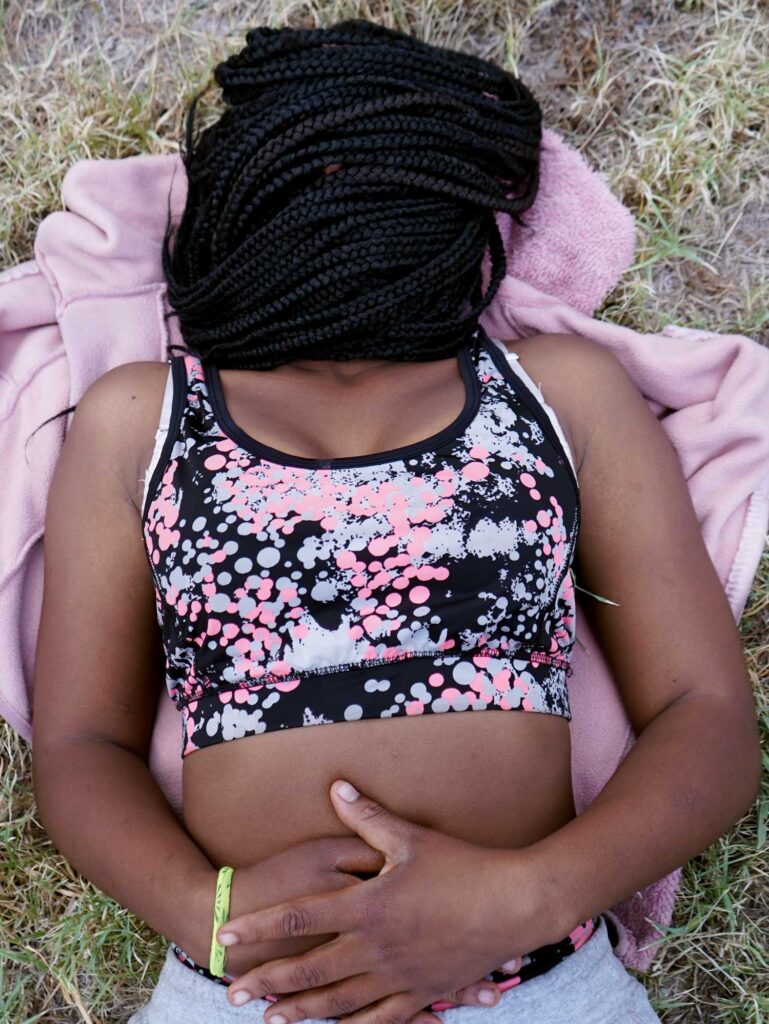
A total of 1,473 crimes committed against migrant women were recorded from January 2018 to August 2023, according to data compiled by IMUMI. The Institute’s data also shows that migrant women suffer the most from gender-related crimes, such as rape. Three-quarters of these crimes are committed against migrating women. Although these numbers may add up to more victims, there is under-reporting due to fear faced by victims about the retaliations of reporting crimes to the authorities because they are unaware of their basic rights and seek to avoid any risk of deportation.
The organization Alternativas Pacíficas (Peaceful Alternatives,) which is dedicated to providing care to migrant women in Matamoros, Tamaulipas, in collaboration with the United Nations Refugee Agency (UNHCR,) assisted around 150 women from January to June 2023, and 50% of these have reported some sort of sexual assault, however, Ángeles Roque, coordinator of the psychology department of the organization, considers that this number is lower than the reality.
On many occasions, cultural aspects are determining factors when communicating with women on the move and providing them with health services, according to Alternativas Pacíficas.
“Women in Haiti generally need a person who acts as a translator, and so talking about a sexual assault with an intermediary can have a lot of negative impact on the survivor,” says Roque. She points out language as one of the barriers, in addition to cultural factors, for women from countries like Haiti to request health services and express their needs.
“They [Haitian migrant women] avoid talking about this type of aggression because they are threatened, and they have told us that they can be abandoned by their partner. This also implies that the partner will take their sons or daughters away from them,” said the psychologist.
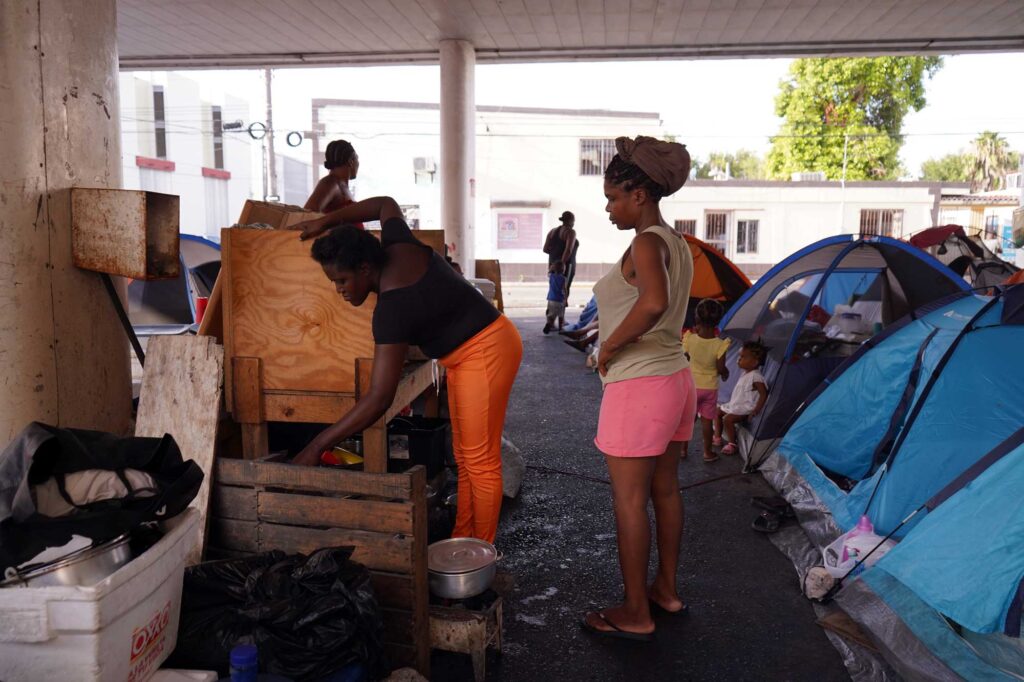
Aracely Pineda, Pro Salud, a non-profit organization which serves the migrant population and has a specific sexual and reproductive health program for women migrating in Tijuana, Baja California, agrees.
“They [the Haitian migrant women,] had a myth among them where they believed when women were taken to the local hospital, they left without their babies with them. They believed that when they performed an ultrasound at the doctor, their babies were killed,” Pineda said about a previous experience with pregnant women from Haiti in Tijuana who were afraid to attend medical consultations.
Babies die from health issues, such as fungal or bacterial infections, that were not treated during the mother’s migrant journey, according to Aracely. Some women are even unaware of their pregnancy until accidental spontaneous abortion strikes them with pain and the loss of their unborn baby.
***
“Every Tuesday and Thursday, we have Doctors Without Borders here. I took a pregnancy test, and it came back positive,” said Daphney, a 32-year-old migrating woman who is currently staying at a makeshift camp at a gas station on the streets of Matamoros, Tamaulipas.
She travels with her husband and two children, and she does not want another child, but she said she does not want to lose her baby either and finds herself in a confusing situation because Doctors Without Borders provides her with basic care. However, she suffers from hypertension and requires special attention, but she and her family do not have access to money and do not trust public health services in Mexico.
“I have a friend who was pregnant and went to see the doctors in Mexico. I know there are several other similar cases, and they gave her a pill to kill the baby she had in her womb,” she said.
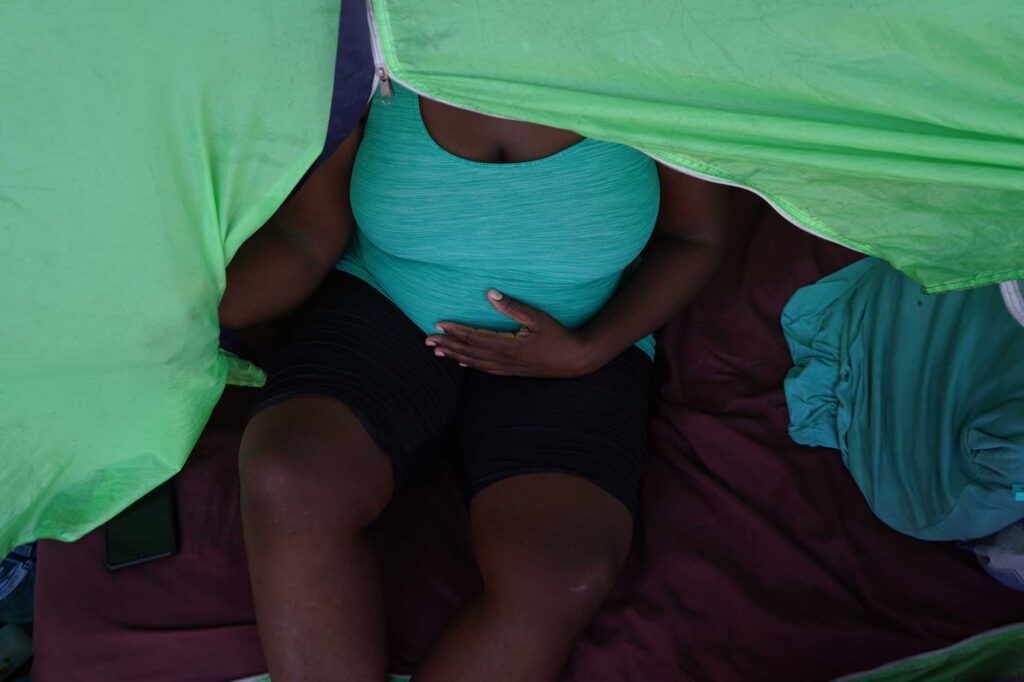
About the train
Alejandra Daniela waited for her humanitarian visa in Oaxaca, Mexico, for two months to travel through Mexico without problems. After processing her immigration documentation, she had little money left as she and her family waited for her documents to be processed. Now, she cannot afford to purchase bus tickets to travel from Mexico City to the northern border for herself, her husband, and her two daughters. They were forced to opt to ride the cargo train.
They arrived at the Huehuetoca “garbage dump” in the State of Mexico at nine in the morning, but the train did not arrive until dawn. “It passed by at around two in the morning. It was immensely cold and dark because there was no light there. Nothing could be seen, and then we were on the train tracks and when the train stopped, we grabbed the first place that we saw by the stairs…”
Daniela traveled pregnant from El Salvador. She brought calcium and vitamins with her. From bus to bus, going around immigration checkpoints, the woman suffered some falls that left her thinking she might lose her baby, but she had to choose to stop and take a rest or keep moving forward and get her two little daughters to safety.
She did not receive medical attention until she got to Tijuana, where she first heard Milan’s heartbeat. She did not think he would make it alive after going days without food.
“I’m very excited because I already have two girls, and this is my boy… I hope that he is born well and healthy. Because of the journey we are going through, I hope he won’t come out with any illness. So far, they have told me that he is doing well,” she said.
Partería y Medicinas Ancestrales AC (Midwifery and Ancestral Medicine,) provides an oasis of medical care for migrant women in Mexico. It is located in the state of Baja California and delivers services in various areas of the state and southern Mexico. Milan was born underwater, sheltered by this group of midwives in Tijuana who sang to him and gave him a loving welcome.
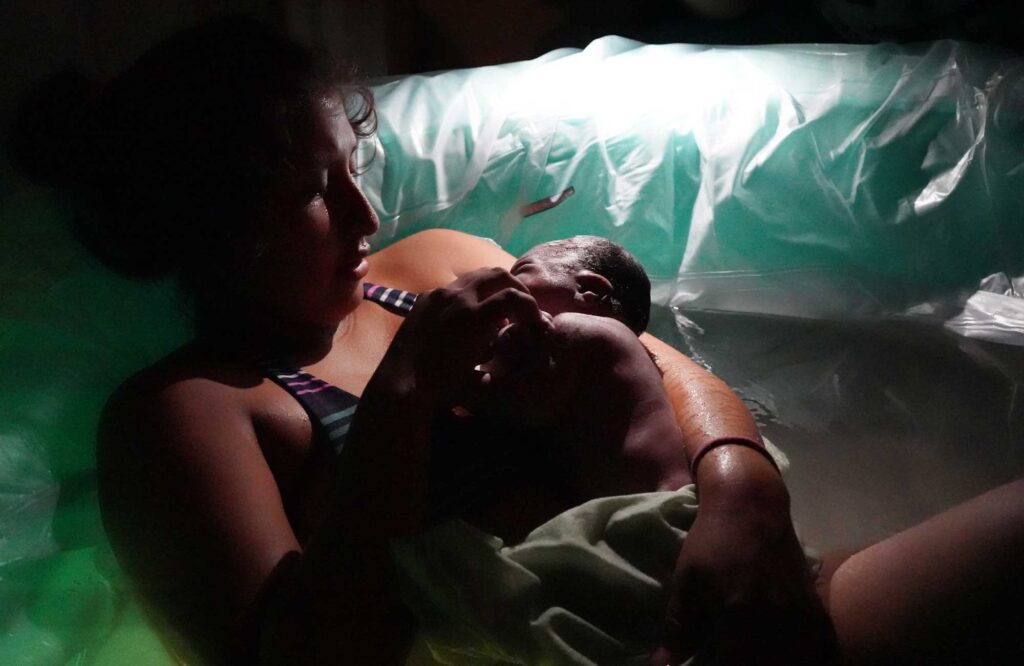
A few days after Milan’s birth, Daniela’s husband surrendered to the U.S. authorities along with their two daughters, who took them to a detention center. Alejandra Daniela stayed with the newborn in a shelter in Tijuana, awaiting for an appointment with U.S. authorities through the CBP One application.
Long waits
The long waits faced by migrants who are currently in Mexico waiting to receive information from the U.S. immigration authorities are due to the various policies applied by both Mexico and the U.S. government, and these mean greater exposure to all the vulnerabilities that migrating women may have.
“People spend up to 4 months waiting for a CBP One appointment… And during those four months, they are exposed to being victims of different violence and different crimes by different factors,” said Roque from Alternatives Pacificas.
A recent study published by the Institute for Women in Migration, in which more than 20 organizations, networks, and human rights defenders worked, exposes the “ setbacks in Mexico’s immigration policy and its impact on the guarantee of women’s rights.” and girls in mobility contexts.”
This report, presented to the United Nations Committee on the Elimination of Discrimination against Women (CEDAW,) states that the migratory flows of women and girls are increasing and that this population constituted 22% of the irregular migrant population from January 2018 to July 2023.
The study identifies several moments of immigration policies that have had an impact on women’s access to health. First of all, the mass deportations of people of Mexican nationality, of which 1 million were registered from January 2018 to July 2023. There were 212,707 cases of returns reported, of which 21.4% were women.
These policies break family ties as some mothers must fight for custody of their sons or daughters in the U.S. without being able to return to the country.
“To the returns and deportations of Mexican people, the returns of non-Mexican people were added, due to the implementation of the “Stay in Mexico” Protocol (enforced between 2019 and 2022), the expansion of Title 42 (enforced between March 2020 and May 2023), and the implementation of Title 8 (currently enforces,)” said the document.
Many of the kidnappings and crimes that migrating people suffer have been after being returned to the Mexico-U.S. border, where women have reported barriers to accessing basic reproductive health services in addition to being subjected to acts of rape and sexual assaults with great difficulty accessing justice.
Activist organizations question Mexico for accepting the expulsions of people from El Salvador, Guatemala, Honduras, Cuba, Haiti, Nicaragua, and Venezuela from the U.S. into Mexico. In addition, they use their National Guard to patrol the borders where migrants have been detained without the presence of the National Migration Institute, which violates their rights.
When the Mexican National Guard began its patrol on the border in 2019, several public images captured armed authority officials detaining migrants to prevent them from crossing the border and subsequently being handed over to the National Migration Institute.
“I hope one day that will change because migrating is not a sin, nor is it a crime, and I hope that one day they will treat us as what we are, human beings looking for a second opportunity,” said Alejandra Daniela, who hopes that these policies will change for the good of all people on the move.
***
This report is part of the series The invisible pain of migrant women, produced with the support of the International Women’s Media Foundation (IWMF) as part of its Reproductive Rights, Health and Justice in the Americas initiative.











